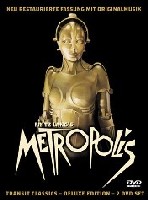Inspired by the new entry [1] of zephyrin_xirdal on „unrealised moscow [2]“ pointing to „The Architecture of Moscow from the 1930s to the early 1950s. Unrealised projects [3]“ I suddenly remembered a lecture I once attended in my subsidiary Volkskunde called „Entdeckung des Alltags im Bild“ held by Prof. Dr. Helge Gerndt [4].

There we discussed the impact of Metropolis [5], one of Germany’s first science-fiction-based movies released 1927 by Fritz Lang [6] (also known for films like Die Nibelungen, M, and Das Testament des Dr. Mabuse), how its impressions might have had an effect on peoples‘ lives and in reverse what might be concluded therefrom to understand their views on everyday routine and vision of the future. The story is based on a novel by Lang’s wife Thea von Harbou; the futuristic scenes were drawn and built especially by Erich Kettelhut [7]… among others.
In spite of legitimate criticism, especially because of the closeness to notions of National Socialism, Metropolis launched to a milestone in expressionist cinematography and had an incredible impact on the people, even if at its times the movie only brought in a partial amount of the enormous production costs of 5 million Reichsmark, almost ruining UFA [8] forever.


„Metropolis beeindruckte das deutsche Publikum, die Amerikaner genossen seine technische Brillanz, die Engländer dünkten sich erhaben, und die Franzosen zeigten sich von einem Film, der ihnen wie eine Mischung aus Wagner und Krupp und im ganzen als alarmierendes Zeichen deutscher Vitalität erschien, beunruhigt.“ (Kracauer, Siegfried, 1979: Von Caligari zu Hitler. Eine psychologische Geschichte des deutschen Films. In: Witte, Carsten: Siegfried Kracauer Schriften Bd. 2. Frankfurt am Main.)
 Due to many recuts and an incomplete version of the original material about 25% of the movie are lost. 2001 the preserved parts were digitally remastered by the Friedrich-Wilhelm-Murnau- Stiftung, the missing parts were replaced by interluding writings (about the process read Filminstitut – Universität der Künste Berlin [9]), since 2003 available in a Deluxe Edition on DVD at e.g. Amazon [10].
Due to many recuts and an incomplete version of the original material about 25% of the movie are lost. 2001 the preserved parts were digitally remastered by the Friedrich-Wilhelm-Murnau- Stiftung, the missing parts were replaced by interluding writings (about the process read Filminstitut – Universität der Künste Berlin [9]), since 2003 available in a Deluxe Edition on DVD at e.g. Amazon [10].